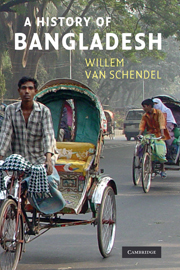Book contents
- Frontmatter
- Contents
- List of plates
- List of maps and figures
- Acknowledgements
- Timeline
- Introduction
- PART I THE LONG VIEW
- PART II COLONIAL ENCOUNTERS
- 5 From the Mughal empire to the British empire
- 6 The British impact
- 7 A closing agrarian frontier
- 8 Colonial conflicts
- 9 Towards Partition
- 10 Partition
- PART III BECOMING EAST PAKISTAN
- PART IV WAR AND THE BIRTH OF BANGLADESH
- PART V INDEPENDENT BANGLADESH
- Conclusion
- Bangladesh district maps
- Key political figures since 1947
- Glossary of Bengali terms
- Notes
- Bibliography
- Index
6 - The British impact
Published online by Cambridge University Press: 05 February 2015
- Frontmatter
- Contents
- List of plates
- List of maps and figures
- Acknowledgements
- Timeline
- Introduction
- PART I THE LONG VIEW
- PART II COLONIAL ENCOUNTERS
- 5 From the Mughal empire to the British empire
- 6 The British impact
- 7 A closing agrarian frontier
- 8 Colonial conflicts
- 9 Towards Partition
- 10 Partition
- PART III BECOMING EAST PAKISTAN
- PART IV WAR AND THE BIRTH OF BANGLADESH
- PART V INDEPENDENT BANGLADESH
- Conclusion
- Bangladesh district maps
- Key political figures since 1947
- Glossary of Bengali terms
- Notes
- Bibliography
- Index
Summary
The British were unlike the Mughals – they wanted more than just to extract Bengal's riches. It was their ambition to transform Bengal's economy to make it yield them much more income. To this end they combined experiences from Britain and Ireland with South Asian practices, subjecting the population of Bengal to an endless series of administrative and economic experiments. Some of these turned out to be successful, others were disastrous. The early introduction of a system of increased tax collection proved to be calamitous in the uncertain natural conditions of Bengal. It was applied rigidly despite a depletion of people's incomes as a result of drought and then floods in 1769–70. Together with unchecked profiteering in the food-grain markets, this led to intense suffering and an epic famine which is still remembered as the ‘Great Famine of 1176’ (chhiyāttarer manbantar*). It is thought that one third of Bengal's population, or a staggering 10 million people, perished. This is how a nineteenth-century researcher described the famine:
All through the stifling summer of 1770 the people went on dying. The husbandmen sold their cattle; they sold their implements of agriculture; they devoured their seed-grain; they sold their sons and daughters, till at length no buyer of children could be found; they ate the leaves of trees and the grass of the field; and in June, 1770, the Resident at the Durbar affirmed that the living were feeding on the dead. Day and night a torrent of famished and disease-stricken wretches poured into the great cities. […]
- Type
- Chapter
- Information
- A History of Bangladesh , pp. 57 - 66Publisher: Cambridge University PressPrint publication year: 2009



